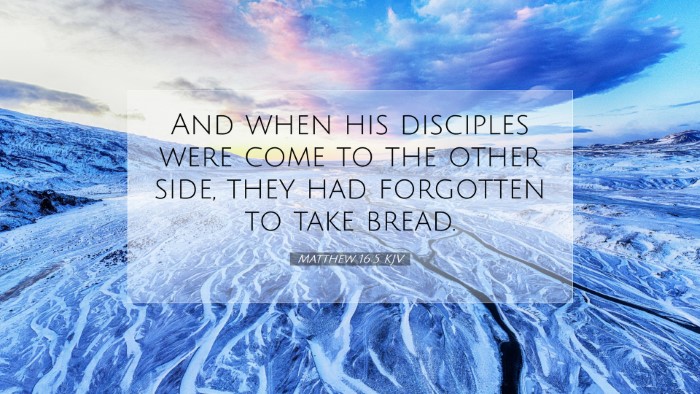Commentary on Matthew 16:5
Matthew 16:5 states: "And when his disciples were come to the other side, they had forgotten to take bread." This verse serves as a prompt for a rich analysis of the broader themes present in this passage, focusing on the spiritual teachings that Jesus communicates through His interactions with the disciples.
Contextual Background
This verse is situated in a larger narrative where Jesus is preparing to expound crucial spiritual truths to His disciples. The disciples’ lapse in memory regarding bread can be seen as more than a mere logistical oversight; it reflects a deeper spiritual misunderstanding that Jesus aims to address.
Discipleship and Spiritual Insight
Matthew Henry emphasizes the distinction between physical needs and spiritual necessities. The disciples, in forgetting bread, symbolize a common human preoccupation with the material, which often overshadows the more significant spiritual sustenance that Jesus represents.
- Material Concerns: The disciples’ forgetfulness signifies their focus on earthly matters.
- Spiritual Preparedness: Jesus, in contrast, calls them to prepare their hearts for deeper truths.
Symbolism of Bread
Albert Barnes notes that bread often symbolizes spiritual nourishment in Scripture. Jesus later refers to Himself as the "Bread of Life" (John 6:35), suggesting that the moment of physical hunger the disciples face is an illustration pointing toward their greater spiritual need. This juxtaposition of physical and spiritual sustenance is central to understanding the dynamics of the encounter:
- Bread as a Necessity: Bread is essential for sustenance, grounding the spiritual lesson in everyday life.
- Bread as a Metaphor: The lack of physical bread reflects a deeper hunger for spiritual truth.
Jesus' Instruction and Correction
Following their lapse, Jesus draws attention to their forgetfulness with a warning. Adam Clarke elaborates on this corrective process, indicating that Jesus uses this moment to teach His disciples to prioritize spiritual understanding over physical understanding.
Exhortation to Discernment
In this context, Jesus employs strong language, advising His disciples to “beware of the leaven of the Pharisees and Sadducees” (Matthew 16:6). This admonition serves multiple purposes:
- Call to Awareness: The leaven symbolizes corrupting influences that can infiltrate one’s spiritual walk, urging caution in spiritual matters.
- Invitation to Reflection: By connecting their mundane concern for bread to a greater spiritual reality, Jesus invites His followers to reflect on their faith.
Theological Implications
From a theological perspective, the encounter highlights the dangers of spiritual blindness. Just as the disciples missed the significance of their situation, Christians today are often preoccupied with earthly worries, forgetting the greater truths of God's provision and faithfulness.
Faith vs. Doubt
Henry posits that this incident is reflective of a lack of faith. The disciples had witnessed Jesus’ miracles; yet, they faltered in trusting that He could provide even in circumstances that seemed lacking. This theme resonates through the Scriptures:
- Faith in Miracles: Disciples often struggle to apply their understanding of Jesus’ power to their own lives.
- Doubt: Their concern for bread transitions into a lesson on the necessity of faith amidst life's uncertainties.
Conclusion
Matthew 16:5 serves as a poignant reminder for believers of all walks—pastors, students, theologians, and scholars alike. The narrative not only conveys the practicalities of life but also emphasizes a profound spiritual lesson: true nourishment comes from understanding and trusting in Jesus, who transcends our physical needs.
As we examine this passage, we are encouraged to seek spiritual discernment over our earthly concerns, allowing the teaching of Christ to transform our priorities and deepen our understanding of His providence in our lives.


